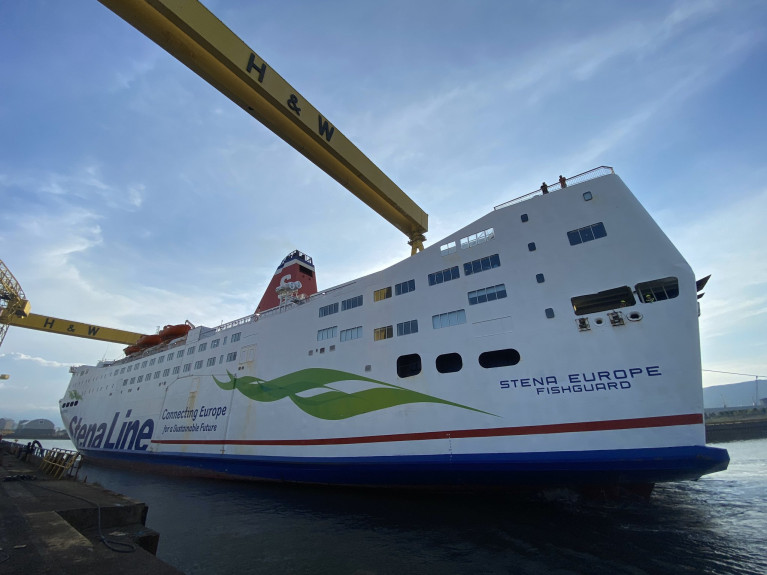Displaying items by tag: H&W shipyard, Belfast
Ferry Operator Stena Line Supports Local Industry with Multi-Ship Docking Programme at H&W, Belfast
Six ferries of Stena Line's Irish Sea fleet will dry-dock at Harland and Wolff’s famous Belfast shipyard this summer for a range of repairs and upgrades.
Currently the Stena Europe (see related relief ferry), which operates on the Rosslare-Fishguard service, is dry-docked in Belfast with the final works project due to be completed on the Stena Superfast VIII (Belfast-Cairnryan service) at the end of September. This is part of the significant docking programme by the Irish Sea’s largest ferry operator.
2020 marks more than 40 years of Stena ships in Belfast’s iconic Harland and Wolff (H&W) shipyard. In April 1980 the firm’s predecessor (Sealink BR) took delivery of the Belfast-built MV Galloway Princess (later Stena Galloway) which operated on the Northern Ireland routes for many years.
Stena Line continues to select the H&W shipyard for docking works on their Irish Sea ferry fleet, with orders totalling £2.5m.
Paul Grant, Stena Line’s Trade Director said: “Despite the dramatic impact of the Coronavirus pandemic on our business, regular ship upgrades and maintenance works are a very important element in our ship management operation. They help us to maintain our excellent reliability record and keep our Irish Sea fleet to the forefront of the ferry sector.”
He added: “Whilst Stena Line has already committed a significant investment to the Irish Sea by introducing two new ships – Stena Estrid (Dublin-Holyhead, Jan 2020) and Stena Edda (Belfast-Liverpool, March 2020) with a third ship to follow for our Belfast-Liverpool service in early 2021, it’s also important that we continue to improve, develop and invest in our existing fleet of vessels, which is exactly what this contract will do.”
John Petticrew, Managing Director of Harland & Wolff said: “Since InfraStrata acquired the Harland & Wolff shipyard, we have built a strong working relationship with Stena Line, demonstrated through the repeat business we have seen with four ships in the yard since our acquisition.”
Belfast-based Paul Grant is head of the company’s Irish Sea operations. His long career at Stena Line includes a short spell working on the mentioned MV Galloway Princess. “We’re delighted that we are continuing our relationship supporting our local shipyard Harland and Wolff and the other local companies involved. Stena Line continues to support Northern Ireland and have operated throughout the Coronavirus pandemic, ensuring that essential supply lines reach their destinations and enabling the flows of freight and travel customers” he said.
The ferry operator is the largest serving on the Irish Sea, with the biggest fleet offering the widest choice of routes including, combined passenger and freight serviceS: Belfast-Cairnryan, Belfast-Birkenhead (Liverpool), Dublin-Holyhead and Rosslare-Fishguard.
As well as a freight only route, Belfast-Heysham. A total of up to 238 weekly sailing options between Ireland and Britain. Stena Line also offers a direct service linking Rosslare and Cherbourg with three return crossings a week.
























































